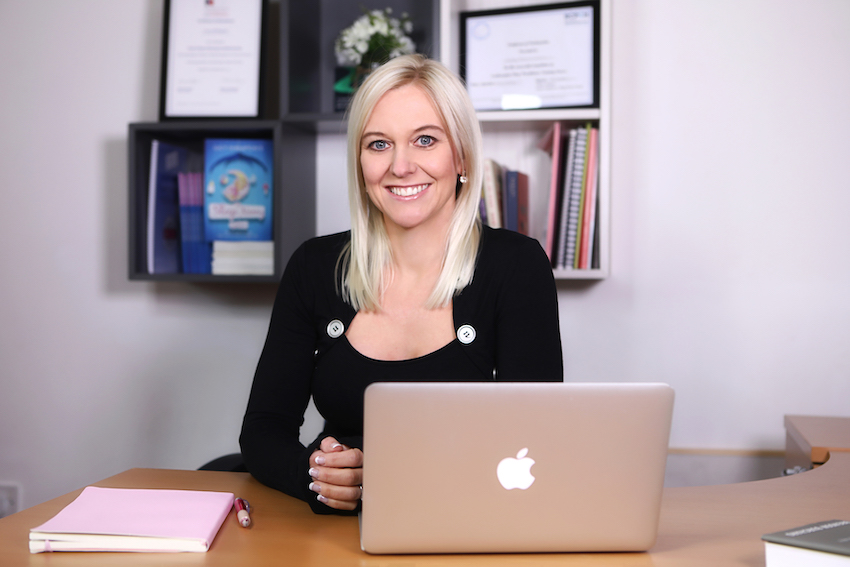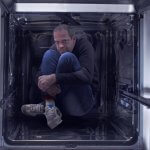Let’s talk about sleep for a moment. How has your’s been during 2020? Have your children had disturbed sleep? During the COVID-19 pandemic, many people have reported having disturbed sleep and my kids have, at times, had disturbed sleep patterns. These issues are all very familiar to Lucy Shrimpton, founder of the Sleep Nanny sleep consultancy.

Lucy has seen a huge increase in demand for her services during 2020. She and her team of consultants are based around the world and they help parents and caregivers of young children to overcome the challenges presented by childhood sleep issues so the entire family can be happy and healthy 9Hint to any men reading this: Lucy is keen to hire more male sleep consultants! See below).
In this Q&A, Lucy explains why she set up Sleep nanny. She also offers some great advice for anyone who is dealing with disturbed sleep.
Why did you decide to set up The Sleep Nanny?
The idea was born in 2013 and after a year of planning, I officially launched The Sleep Nanny in 2014. The reason I started it was because I had experienced huge sleep deprivation after the birth of my first child and knew exactly how horrendous it makes you feel. I recall telling my husband I felt more broken than when I lost my father; that’s how huge of an impact sleep deprivation can have on our minds.
My son slept well as a baby but at around 15 months, his sleep unravelled and at 21 months, when my daughter was born, we decided to get some expert advice. It was fascinating and I was captivated by the science as well as the impact it all has on a family’s life.
In time, I reached a point where I could no longer sit back and see other families suffer unnecessarily in the same way that we had done. I knew from experience that little ones could be sleeping so much better than they were, it was just a matter of educating parents on how to help them. It really did feel like it was a calling for me and that’s when I decided to create my brand.
Have you seen a rise in the number of people coming to you and your team for sleep advice during the pandemic?
Yes, I’ve seen a significant rise in the number of parents coming to me as more and more people have shown signs of anxiety since the pandemic began. Sleep has been a key victim in the pandemic, with 70% of Brits aged 40 to 63 reporting changes to their sleeping patterns since lockdown began, according to The British Sleep Society.
Children are more anxious than ever before as the uncertainty of world events takes its toll. Similarly, babies and children pick up on the worries of parents but once you are able to help one member of the family with their sleep issues it has a huge knock-on effect for everyone.
While much of our support is now offered online, we still provide regular advice as much as families need it and when allowed, visit families in their homes to give face-to-face advice.
What advice would you give to adults struggling to sleep right now with all the worries going on?
Here are my top pieces of advice for parents who are struggling:
● Try to keep a relaxing bedroom environment. Warm lighting, candles, soothing music will make your bedroom your retreat to escape the world and unwind in.
● Try not to work in your bedroom if you can by setting up a desk in another part of the house while working from home. Or, if you don’t have a choice because space is limited try to transform your work desk so that it looks completely different when you’re not on allocated work time. Put your computer and paperwork out of sight and make something else in the room the key focal point so that you’re not reminded of work just as you’re trying to drift off to sleep.
● As hard as it might be, especially for those who use your phone as your alarm clock, try to limit your screen time for at least an hour before you want to sleep. The blue light prevents the production of melatonin, the hormone that controls sleep, keeping you awake for longer.
● Try not to eat dinner too late, and avoid sugary foods or caffeine for at least three hours before bed. Foods containing high levels of tryptophan like bananas, green leafy vegetables, eggs and dairy combined with some fibre filled carbohydrates are the best combination to promote healthy sleepiness.
● Keeping a notepad close by or even beside your bed is a great idea for those with a busy mind. You can unload your thoughts, ideas and ‘to dos’ by brain dumping these onto a page and allowing your mind to let go and relax.
● Find a good book to read before bed that’ll help tire your eyes out and take you to another world.
And for those dads with children who have shown problems sleeping regularly right now?
I’ve seen a lot of exhausted dads with little ones who now struggle to settle at bedtime, or wake multiple times in the night with no way of getting back to sleep. I’ve also seen an increase in dads reaching out for help, perhaps because more are working from home or closer to the pains and strains of unsettled children.
- My top piece of advice is get into a consistent bedtime routine – the cue and rhythm of which will help them settle. A consistent bedtime for children up to the age of eight should be between 6pm and 8pm.
- Avoid over tiredness, it’s the root of all sleep problems.
- Be aware of what your child is picking up and hearing – conversations you might have with other adults, on the phone, the TV or radio. When they pick up tensions or certain words it can cause anxiety.
- Talk honestly and openly with your child if they want to discuss the changes going on in the world and let them share their worries with you. While you’ve not got the remedy to the problem, talking about their feelings will help allay some of their anxieties and bring you closer together.
- Be utterly consistent, so if they wake up don’t let them crawl into your bed one night and not expect them to want to another. Consistency is key.
- Like with adults, avoid screen time for at least an hour before bedtime.
- Similarly, make sure your children avoid sugar or caffeine that can cause a temporary surge of alertness that will hinder sleep.
What parenting advice would you give to dads of newborn babies born during the pandemic?
It has been an extremely difficult time to become a new parent this year so hats off to any new dads who have been through it. The chances are you and your partner have been left to go it alone in these first few months which might be a blessing or a curse depending on how you feel! However, for those dads whose babies are struggling to get into a healthy sleep routine, here is my advice:
As for older children, get into a consistent bedtime routine, at the same time and place each evening.
● If your baby wakes up early, don’t be tempted to put them to bed later. The number one reason why babies and toddlers wake up early is over-tiredness so a period of early nights should remedy this.
● Keep your nap times consistent during the day and sustain these naps until they are around three and a half or four years old. Little children with really alert temperaments will appear not to need (or want!) these naps but they actually need it more and for longer than their more laid back peers. Children over three and above who are sleeping a solid 12 hours a night probably won’t need a nap.
● If you are really struggling to get your baby to sleep and sustain a regular sleep pattern then get help from a professional sleep nanny. There is really no need to suffer and you are jeopardising your and your family’s health and wellbeing. And with online zoom calls, it’s easier than ever to get that help.
What are the most common problems that parents face when it comes to interrupted sleep?
Early wakings, so that’s anything before 6am and is usually around the 5am mark. It is very difficult to re-settle a child who wakes at this time and it can be a slower challenge to resolve. Another big one is napping in the day. So often little ones are not getting enough sleep in the day or the timing is not great and it leads to over tiredness and further problems at night. There are also nighttime fears from around the pre-school age with lots of little ones not wanting to be alone and seeking lots of interactions from parents rather than settling to sleep.
What about co-sleeping? Yes or no?
Exactly! It has to be yes or no, but you cannot have it both ways at your convenience. Either allow it, anytime, or deny it every time. Too many parents let their little ones into their beds around 5am when they are too groggy to deal with another waking, but then they deny that option the rest of the night. It’s not fair and gives a mixed message to a young child so either has to be allowed, or not allowed, period.
If a child is suffering from regular night terrors or wetting the bed in the night – what advice would you give?
They are two very different challenges to tackle. Night terrors are a fascinating topic and just to be clear, they are nothing like nightmares or very bad dreams. My advice to a parent of a child who is suffering from true night terrors or confusional arousals as they appear in younger children, is to monitor the child’s safety and wait for the episode to pass. Assess their overall sleep patterns and spot where they are lacking in sleep because these episodes are due to over tiredness. Perhaps earlier to bed or resolve daytime sleep challenges.
For bed wetting, I would recommend a potty training plan and in the meantime, protect the bedding or layer it up so that any accidents can be dealt with swiftly, calmly and quietly at night with as little disruption or engagement as possible.
Are there any particular sleep issues that affect mums?
Mainly if mum is exclusively breastfeeding and has found it difficult to express and introduce bottles. Being able to share the feeding duties can really help mum to get the rest she needs but when it is all on her, the exhaustion can reach dangerous levels.
You mention that you also train people up to become Sleep Consultants. What advice would you give to a dad who is considering this transition?
I would say go for it and don’t be afraid of it being a female dominant field because that will give you an edge! There are lots of dads who would love to work with a male consultant, especially if he has experienced things from a dad perspective! We’d love to train you!
We have had some men explore the opportunity mostly from an education or childcare background and I’d love to see more dads take that step forward. I don’t think there are any well known male sleep consultants in the behavioural field so you could be the first and we could show you how to make a massive impact!
There are so many sleep aid products available on the market these days. Would you recommend any?
Black out blinds or curtains are fantastic as they give the bedroom a darkened effect. These are so helpful when your baby or toddler is having a daytime nap or for those light summer evenings or bright early mornings. You can have normal blinds and curtains and a blackout blind underneath if you’d like.
Babies today often sleep in sleeping bags that come in different togs and have different features, such as detachable arms, zippers or safety covers. They are very safe as the baby’s head can’t get stuck under the blankets and with the correct tog you know they won’t be too hot or cold.
Night lights are a great way to help you see your little one when you check up on them without having to turn the main light on and risk waking them up. They’re also very useful when your child gets older and you want ‘just’ enough light in the room for when they go to the loo in the night. Make sure you choose a red or amber colour, not blue or white.
Video monitors are also essential for parents wanting to check up on their babies during night time or nap-time. Ideally you want it to come with a temperature gauge so you know if the room is warm or cool enough.
Lucy Shrimpton is the founder of The Sleep Nanny (which can be found online here). Her team of sleep consultants is based across the UK and around the world help parents and caregivers of babies and young children to overcome the challenges with childhood sleep so that they can be healthy and happy and enjoy these precious years.







